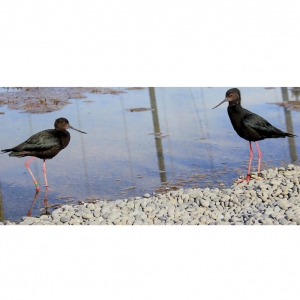Displaying items by tag: Shore Plover
Shore Plover - Tuturuatu
There was a slow start to the New Zealand shore plover/tuturuatu breeding season, most likely due to the severe winter. The Isaac Conservation and Wildlife Trust said three out of four NZ shore plover pairs are breeding. The fourth pair had not bred last spring, due to a grumpy male.
The first clutches had been lifted for artificial incubation, with eight chicks hatched. Two second clutches have been lifted, with another due shortly. The third clutches will be left with the pairs to rear.
Chicks will be directly transferred to offshore island holding aviaries, rather than to Trust aviaries, a new move to minimise dispersal, due to protect hatch site. Department of Conservation monitoring on Waikawa/Portland Island recently reported five pairs on eggs and one pair with a chick.
Photographed (left), a recently hatched critically endangered shore plover chick as it checks out its brooder box surrounds on the hunt for tasty mealworms. Shore plover are one of New Zealand’s very rarest of birds and are one of the world’s most threatened waders. They continue to be on the brink and captive breeding efforts are essential in creating and maintaining translocated offshore island populations.”
Sabrina Luecht
Breeding success continues at Mt Bruce Pukaha
Breeding success continues at Mt Bruce Pukaha
Shore Plover:
26 chicks were raised with some released at Waikawa and some at Motutapu. Four remain at Pukaha to continue with the breeding programme.
Pateke:
18 ducklings from the two breeding pairs at Pukaha. These were sent to the pre-release site, Peacock Springs near Christchurch, before they are released into the wild.
Whio:
2 male and 1 female ducklings hatched and reared by a pair at Pukaha have been sent to the pre-release site at Turangi. 13 ducklings were hatched from eggs collected from wild sites and of these 9 are male and 4 are females. They will remain at Mt Bruce Pukaha.
Spring Has Sprung
The 2017/18 breeding season has begun and The Isaac Conservation and Wildlife Trust (ICWT) once again reached its busy rearing phase.
Early October saw the collection of the first clutch of critically endangered New Zealand shore plover eggs for artificial incubation. Critically endangered black stilt/kaki pairs had also begun laying eggs.
ICWT is happy to report that three clutches have been incubated by critically endangered orange-fronted parakeet breeding pairs, as well as eight healthy chicks presently being raised. (see page 9).
The first South Island blue duck/whio ducklings hatched, while North Island ducklings hatched soon after. Meanwhile five brown teal/pateke pairs have hatched ducklings and more will be on the way.
ICWT’s reptiles are becoming more active with the warming weather, meaning tuatara, Otago skinks and grand skinks will be breeding as well.
As always, ICWT’s ambitious native planting programme across the Isaac Conservation Park and the Otukaikino River restoration site continues; while salvaged historic buildings continue to be restored to their former glory in the Heritage Village.
For more information see:
http://www.isaacconservation.org.nz/
https://www.facebook.com/ICWTNZ/
Sabrina Luecht,
Wildlife Project Administrator,
ICWT

